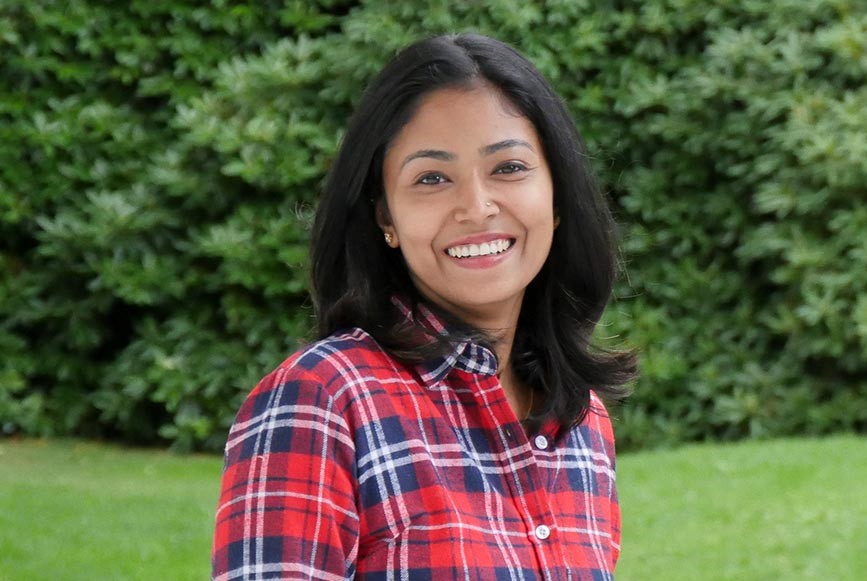PhD student, Institute for Resources, Environment and Sustainability, University of British Columbia
What is your PhD dissertation about?
My PhD research lies at the intersection of ecology and anthropology connected through the themes of biodiversity conservation, Indigenous studies and environmental policies. It examines how the relationship between forests and Indigenous societies in India have transitioned as a function of India’s forest and wildlife policies post-Independence. The study engages Indigeneity theories and philosophies of Kattunayakars, a lesser-known hunter-gatherer community of South Asia through the conversations on human-wildlife interactions, food security, forest fires and rights-capabilities. Residing within the forests of the Western Ghats (one of the Global Biodiversity hotspots), these traditional societies offer insights on changes in local ecosystems through the lens of culture, traditional knowledge and shared living experiences. I use a combination of qualitative and quantitative methods in my study. Semi-structured interviews transect walks and participatory observations form a significant portion of my qualitative methodology framework. Surveys, GIS, and Non-Timber Forest Products data makes the quantitative component. Bringing insights from both these methods, I have produced and co-directed a documentary as a research dissemination tool to be released next year.
Who has been an influential conservation thinker to you, and why?
In my life, I have had two influential environment and conservation thinkers, Jane Goodall and Sylvia Earle.
In my formative school years, learning about Jane Goodall and her commitment to science bolstered my interest in nature and wildlife. In a time when women were considered too emotional and inappropriate for field-based studies. Jane broke the norms and proved that women are excellent scientists and field researchers. She made conservation biology a career that is accessible to young girls across the globe. Inspiration drawn from her work is one of the reasons why I chose to pursue my majors in Zoology.
After graduation, while working in South Asia, I was often irritated with the slow progress made in the environment sector, and naturally questioned the role of individual actions and contributions. Every time I asked the worthiness and impact of my work in the real world, Slyvia Earle came to my rescue. Her thoughts on the significance of individual actions kept me going – “Many of us ask what can I, as a person do, but history shows that everything good and bad starts because somebody does something or does not do something.” For me, Sylvia Earle was one of the daring women who pushed scientific boundaries each day through her actions. Fortunately, being a National Geographic Explorer (2018), I got the privilege to meet her in person at a National Geographic explorers fest 2019 in Singapore. We interacted, and I mentioned my work, she patiently listened. It was one of the most beautiful experiences in my life.
If you could tell her/him one thing about your work, what would it be?
First, I would thank these wonderful women for sharing their love for science and nature with young people. Through my work, I intend to use the socio-ecological momentum they created to advance our knowledge of human and nature interrelations. I would tell them that I work with Indigenous and marginalized societies who do not have a strong and persuasive platform to share their stories. These traditional people understand the natural world in ways that conventional science does not. Embedded within their ways of living lies answers to some of the problems that our world is currently struggling with, such as global warming, biodiversity loss, food security. Hence, the voices and perspectives of native communities must be heard, and Indigenous science is decolonized. In my work, I am lending a platform for this process. I urge everyone to consult, engage and cooperate with Indigenous whenever and wherever possible.
What do you envision post PhD?
Post PhD I envision to continue my interdisciplinary research engagements with communities globally seeking ways to decode Indigenous understanding of nature. My goal is to identify methodologies and models that can be used to study and interpret the relationship between traditional societies and their local ecosystems as they navigate the socio-economic and political transitions.
If you had one wish, what invention you would like to see being developed to solve environmental problems?
If I had one wish for an invention that I would like to see being developed to solve environmental problems, that would be to the time machine and human brain rewiring combo. Time machine will take us back to undo all wrongdoings of humans. The brain-machine will rewire human brains to be empathic towards ecological problems.
Helina’s Biosketch
Helina Jolly is a PhD candidate at the Institute for Resources Environment and Sustainability, University of British Columbia. She is a National Geographic Explorer (2018), UBC Public scholar (2017 and 2018), and Liu scholar (2016). An ecologist and environmental policy analyst by training, she studies the relationship between forest ecosystems and Kattunayakars, a lesser-known hunter-gatherer society of South Asia. Her doctoral research examines the complexities of human and nature connections within the forest landscapes of the Western Ghats in Kerala, India, through the conversations on human-wildlife interactions, food security, forest fire and rights- capabilities. Helina is also the founder of an international web-based project, ‘The Everyday Nature’ (www.theeverydaynature.com) that focuses on documenting the perception of people towards nature. She also leads the Collective for Gender+ in Research at the UBC that seeks to develop a network to articulate methods and tools to engage gender in research. Before joining UBC, Helina worked in India for six years on various environmental projects in South Asia with the German Development Cooperation (GIZ), Centre for Science and Environment and Clinton Climate Initiative. She is a Commonwealth Scholar and has an MSc in Environmental Policy and Regulation from the London School of Economics and Political Science.
